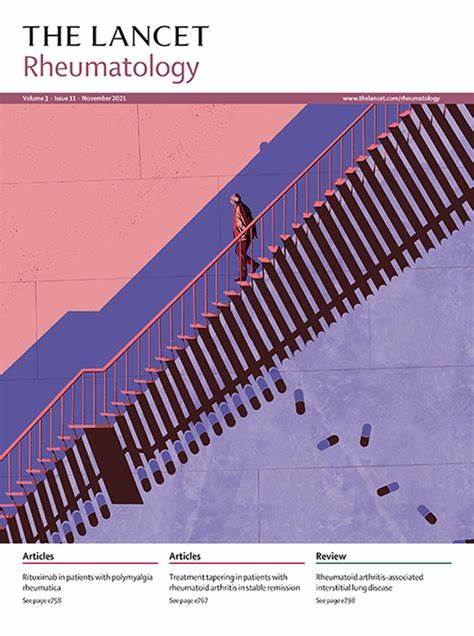Effect of a 1-month methotrexate delay on pneumococcal vaccine immunogenicity and disease control in patients with early rheumatoid arthritis (VACIMRA): an open-label randomised trial
IF 16.4
1区 医学
Q1 RHEUMATOLOGY
引用次数: 0
Abstract
Background
Pneumococcal vaccination is recommended for patients with rheumatoid arthritis. Because immunosuppressant therapies for rheumatoid arthritis hinder vaccine efficacy, vaccination should be administered before initiating immunosuppressive drugs. We aimed to compare humoral responses in patients with rheumatoid arthritis receiving the pneumococcal 13-valent conjugate vaccine (PCV13) before methotrexate initiation or simultaneously.
Methods
In this randomised, multicentre, open-label trial, patients were recruited from 26 rheumatology departments in 22 university hospitals and four general hospitals in France. Adult patients (aged 18–80 years) with active rheumatoid arthritis (Disease Activity Score in 28 joints >3·2), who were naive to targeted disease-modifying anti rheumatic drugs (DMARDs), had not had methotrexate or leflunomide in the past 3 months, and had no previous pneumococcal vaccinations were included. Patients were excluded in case of treatment with methotrexate or with leflunomide within the previous 3 months and absolute or relative contraindications to methotrexate. Patients were vaccinated with PCV13 at randomisation, before being randomly assigned (1:1) to either the immediate group (methotrexate treatment [maximum dose 15 mg per week] initiated at the same time as PCV13 vaccine) or the delay group (methotrexate initiated 1 month after PCV13 vaccine). Randomisation was stratified by sex (self-reported) and DMARD naive status. 2 months later, patients in both groups were vaccinated with the 23-valent pneumococcal polysaccharide vaccine. Humoral responses, disease activity, infections, and adverse events were assessed at baseline and at 1, 3, 6, and 12 months after PCV13. The primary outcome was the responder rate at 1 month, defined by positive responses against at least three of five target serotypes (ie, 1, 3, 5, 7F, and 19A). Responders were defined according to a 2 or more-fold increase in IgG concentrations with ELISA or opsonophagocytic assay compared with baseline. The main analysis was performed in the modified intention-to-treat population, including all randomly assigned patients with a valid measure of the primary endpoint, analysed in their assigned group. There was no involvement of people with lived experience in the study design or implementation. The trial was registered at ClinicalTrials.gov (NCT01942174) and is completed.
Findings
Between Sept 27, 2013, and Oct 10, 2019, 276 patients with rheumatoid arthritis were randomly assigned. 27 patients were excluded, of whom four patients dropped out, and 249 patients were included in the modified intention-to-treat population (126 [51%] in the delay group and 123 [49%] in the immediate group). 174 (70%) patients were female and 75 (30%) were male, the mean age at enrolment was 55·6 years (SD 14·8). Responder rates were higher in the delay group compared with the immediate group for IgG concentrations (relative risk 1·46 [95% CI 1·10–1·92]; p=0·02) and for opsonophagocytic assay activity (1·65 [1·25–2·19]; p=0·01), adjusted for sex and true DMARD naive status. At 12 months, antibody functional activity was significantly higher for eight of 13 serotypes in the delay group. Cumulative doses of corticosteroids and the number of patients who had targeted DMARDs were similar between groups throughout. 72 (11%) of 649 adverse events were serious (including one vaccine-related serious adverse event) in both groups and were equally frequent between groups, and the rheumatoid arthritis disease activity score remained comparable during follow-up.
Interpretation
In patients with early rheumatoid arthritis, the PCV13 vaccine administered 1 month before methotrexate allowed for improved immunological responses without significant effect on disease control during one year of follow-up. Future steps are to confirm these results with PCV20 or PCV21 and assess the best time frame for the booster vaccine.
Funding
Government of France and Pfizer.
Translation
For the French translation of the abstract see Supplementary Materials section.
甲氨蝶呤延迟1个月对早期类风湿关节炎(VACIMRA)患者肺炎球菌疫苗免疫原性和疾病控制的影响:一项开放标签随机试验
背景:类风湿关节炎患者推荐接种肺炎球菌疫苗。由于类风湿关节炎的免疫抑制疗法会阻碍疫苗的疗效,因此在使用免疫抑制药物之前应进行疫苗接种。我们的目的是比较类风湿关节炎患者在甲氨蝶呤起始前或同时接受肺炎球菌13价结合疫苗(PCV13)的体液反应。方法:在这项随机、多中心、开放标签的试验中,患者从法国22所大学医院和4所综合医院的26个风湿科招募。成人(18-80岁)活动性类风湿关节炎(28个关节疾病活动评分>.3·2),首次使用靶向疾病改善抗风湿药物(DMARDs),过去3个月未使用甲氨蝶呤或来氟米特,既往未接种肺炎球菌疫苗。排除在过去3个月内接受过甲氨蝶呤或来氟米特治疗的患者以及甲氨蝶呤的绝对或相对禁忌症。患者随机接种PCV13疫苗,然后随机分配(1:1)到立即组(与PCV13疫苗同时开始甲氨蝶呤治疗[每周最大剂量15毫克])或延迟组(在PCV13疫苗接种1个月后开始甲氨蝶呤治疗)。随机化按性别(自我报告)和DMARD初始状态分层。2个月后,两组患者均接种23价肺炎球菌多糖疫苗。在基线和PCV13后1、3、6和12个月评估体液反应、疾病活动性、感染和不良事件。主要终点是1个月时的应答率,定义为对5种目标血清型(即1、3、5、7F和19A)中至少3种的阳性应答。应答者根据ELISA或调理吞噬细胞测定的IgG浓度与基线相比增加2倍或更多来定义。主要分析是在修改意向治疗人群中进行的,包括所有随机分配的具有有效主要终点测量的患者,并在其指定组中进行分析。在这项研究的设计和实施中,没有让有生活经验的人参与。该试验已在ClinicalTrials.gov注册(NCT01942174)并已完成。研究结果:2013年9月27日至2019年10月10日,276例类风湿性关节炎患者被随机分配。27例患者被排除,其中4例患者退出,249例患者被纳入修改意向治疗人群(延迟组126例[51%],立即组123例[49%])。女性174例(70%),男性75例(30%),平均入组年龄55.6岁(SD 14.8)。IgG浓度延迟组应答率高于立即组(相对危险度1.46 [95% CI 1.10 - 1.92];P = 0.02)和调理噬细胞活性(1.65[1.25 -2·19];p=0·01),根据性别和真正的DMARD幼稚状态进行调整。在12个月时,延迟组13种血清型中有8种抗体功能活性显著升高。皮质类固醇的累积剂量和靶向dmard的患者数量在两组之间是相似的。两组649例不良事件中有72例(11%)为严重不良事件(包括一例与疫苗相关的严重不良事件),并且两组之间的发生率相同,类风湿关节炎疾病活动评分在随访期间保持可比性。解释:在早期类风湿关节炎患者中,在甲氨蝶呤治疗前1个月接种PCV13疫苗可以改善免疫反应,但在一年的随访中对疾病控制没有显著影响。未来的步骤是用PCV20或PCV21确认这些结果,并评估加强疫苗的最佳时间框架。资助:法国政府和辉瑞公司。翻译:摘要的法文翻译见补充资料部分。
本文章由计算机程序翻译,如有差异,请以英文原文为准。
求助全文
约1分钟内获得全文
求助全文
来源期刊

Lancet Rheumatology
RHEUMATOLOGY-
CiteScore
34.70
自引率
3.10%
发文量
279
期刊介绍:
The Lancet Rheumatology, an independent journal, is dedicated to publishing content relevant to rheumatology specialists worldwide. It focuses on studies that advance clinical practice, challenge existing norms, and advocate for changes in health policy. The journal covers clinical research, particularly clinical trials, expert reviews, and thought-provoking commentary on the diagnosis, classification, management, and prevention of rheumatic diseases, including arthritis, musculoskeletal disorders, connective tissue diseases, and immune system disorders. Additionally, it publishes high-quality translational studies supported by robust clinical data, prioritizing those that identify potential new therapeutic targets, advance precision medicine efforts, or directly contribute to future clinical trials.
With its strong clinical orientation, The Lancet Rheumatology serves as an independent voice for the rheumatology community, advocating strongly for the enhancement of patients' lives affected by rheumatic diseases worldwide.
 求助内容:
求助内容: 应助结果提醒方式:
应助结果提醒方式:


